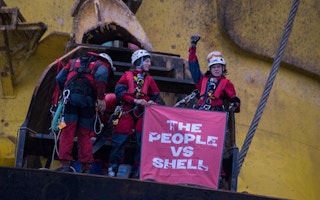To protest Shell’s plan to drill for oil in Alaska, six Greenpeace campaigners have climbed aboard an Arctic-bound oil rig in the middle of the Pacific Ocean on Tuesday.
To continue reading, subscribe to Eco‑Business.
There's something for everyone. We offer a range of subscription plans.
- Access our stories and receive our Insights Weekly newsletter with the free EB Member plan.
- Unlock unlimited access to our content and archive with EB Circle.
- Publish your content with EB Premium.
Greenpeace said six of its members from the United States, Germany, New Zealand, Australia, Sweden and Austria approached Polar Pioneer at dawn and began scaling up the 38,000-tonne platform as they planned to set up camp on the underside of the ship’s main deck and unfurl a banner with the names of millions of people who oppose oil drilling in the Arctic.
The Polar Pioneer, which was 750 miles northwest of Hawaii at the time, is one of Shell’s contracted oil rigs and being transported by a heavy-lift vessel that took off from the Brunei Bay in early March. It is headed to the port of Seattle before it proceeds to the Chukchi Sea, which is US territory in the Arctic Circle.
Greenpeace’s ship, Esperanza, where the activists launched their quest, has been pursuing Polar Pioneer since it took off from the bay, crossing much of the Pacific Ocean.
The activists, who are all experienced climbers, are equipped with food supplies and communications technology to link up with supporters around the world in real-time, the environmental group added, noting that they will not interfere with the ship’s navigations and operations.
Aliyah Field, one of the six, sent a message through her Twitter account: “We made it! We’re on Shell’s platform. And we’re not alone. Everyone can help turn this into a platform for people power! #TheCrossing.”
“
World leaders continue to consign our future into the hands of dirty fossil fuel companies.
Anna Abad, Climate Justice Campaigner for Greenpeace Southeast Asia
Johno Smith from New Zealand, who also boarded the vessel, said they wanted to focus the world’s attention on the drilling that Shell plans to start in less than 100 days in the Arctic Sea.
“Shell’s actions are exploiting the melting ice to increase a manmade disaster. Climate change is real and already inflicting pain and suffering on my brothers and sisters in the Pacific,” he said.
The United States Department of Interior upheld Shell’s drilling lease last week after years of delay, paving the way for the multinational oil firm to return to its exploration in the Chukchi Sea.
The US government in 2008 issued the license to drill in Chukchi for which Shell paid US$2.1 billion. The oil firm had stopped its drilling attempts in 2012 following a series of setbacks; one of its rigs ran aground an island in the Gulf of Alaska and was also caught violating US emissions limits.
The Department of Interior’s Bureau of Ocean Energy Management will still have to review Shell’s new exploration plan and conduct an environmental assessment on it before Shell can move ahead with the drilling. This could take at least 30 days, the US media reported last week.
The oil giant told news agencies on Tuesday that what the activists have done is illegal and poses danger to the crew and to themselves. It has filed a complaint in Alaska’s court to remove the activists from the rig.
Shell spokeswoman Kelly op de Weegh said the oil firm will not condone these illegal tactics. “Nor will we allow these stunts to distract from preparations underway to execute a safe and responsible exploration programme,” she said in a statement.
Anna Abad, climate justice campaigner for Greenpeace Southeast Asia, voiced her concern about the recent approval of oil drilling in the Arctic, and stressed that these actions are ignoring the climate risks posed to vulnerable communities in Asia Pacific.
“As world leaders continue to consign our future into the hands of dirty fossil fuel companies, more intense and destructive storms are being felt across the globe and are set to become the ‘new normal’, altering the lives of millions of people,” she commented in a statement.
Updated (15 April): Greenpeace said the six climbers have since left the oil rig on Saturday after spending almost a week on the 38,000 tonne platform. They left due to worsening weather at sea, before a judge granted Shell’s request for a temporary restraining order against Greenpeace.










